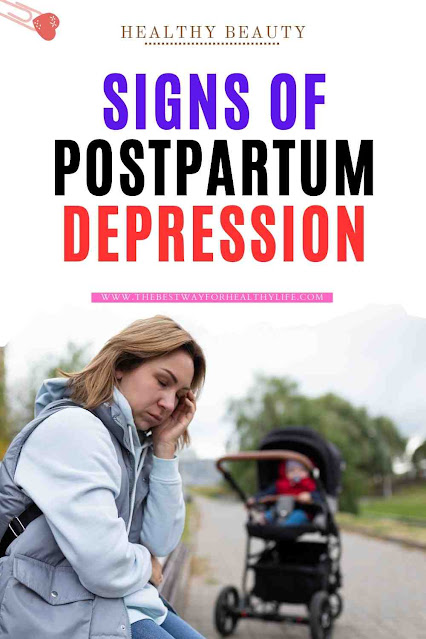Signs of Postpartum Depression
 |
| signs of postpartum depression |
Signs of Postpartum Depression
I. Introduction
Postpartum depression (PPD) is a common condition that affects many new mothers. It can cause sadness, anxiety, and difficulty bonding with the baby.
Recognizing the signs of PPD is crucial to getting the help you need to recover and care for yourself and your baby.
II. Signs of Postpartum Depression
A. Emotional Symptoms
- Feelings of sadness or emptiness
One of the hallmark signs of PPD is a persistent feeling of sadness or emptiness. You may feel like crying often or feel a sense of hopelessness. It's important to remember that these feelings are not your fault and that help is available.
- Extreme mood swings
PPD can cause extreme mood swings, such as feeling irritable, angry, or anxious one moment and then feeling completely fine the next. These mood swings can be confusing and overwhelming.
- Difficulty bonding with the baby
It's common for new mothers to feel a strong bond with their babies, but for mothers with PPD, this can be a challenge. You may feel like you don't love or care for your baby, which can cause guilt and shame.
- Anxiety or panic attacks
Anxiety or panic attacks can be a sign of PPD. You may experience excessive worry, fear, or physical symptoms like heart palpitations or sweating.
- Thoughts of harming self or baby
In severe cases, PPD can lead to thoughts of self-harm or harm to the baby. These thoughts can be frightening and may require immediate medical attention. It's important to seek help if you are experiencing these thoughts.
B. Physical Symptoms
- Extreme fatigue
PPD can cause extreme fatigue beyond the normal tiredness of caring for a new baby. You may feel exhausted even after getting enough rest.
- Loss of appetite or overeating
Changes in appetite can also be a sign of PPD. You may experience a loss of appetite or overeat to cope with your feelings.
- Insomnia or excessive sleep
PPD can also affect your sleep patterns. You may have trouble falling asleep, staying asleep, or sleeping excessively to escape your feelings.
- Physical aches and pains
PPD can cause physical symptoms such as headaches, stomachaches, or muscle tension.
C. Behavioral Symptoms
- Withdrawing from friends and family
PPD can cause you to withdraw from social situations and isolate yourself from friends and family. You may feel like you don't want to be around others or that they don't understand what you're going through.
- Lack of interest in activities
You may lose interest in activities you once enjoyed, such as hobbies or spending time with friends. This can be a sign of PPD.
- Poor hygiene and self-care
PPD can make it difficult to take care of yourself. You may neglect personal hygiene or basic self-care tasks like showering or brushing your teeth.
- Difficulty concentrating
PPD can also affect your ability to concentrate or make decisions. You may find it hard to focus or feel like you're in a fog.
III. Conclusion
It's important to seek help if you are experiencing any signs of postpartum depression. PPD is treatable, and recovery is possible.
Talk to your healthcare provider or a mental health professional if you think you may have PPD. There are also resources available such as support groups, therapy, and medication, that can help you on your road to recovery. Don't suffer in silence; reach out for help.
Post a Comment for "Signs of Postpartum Depression"